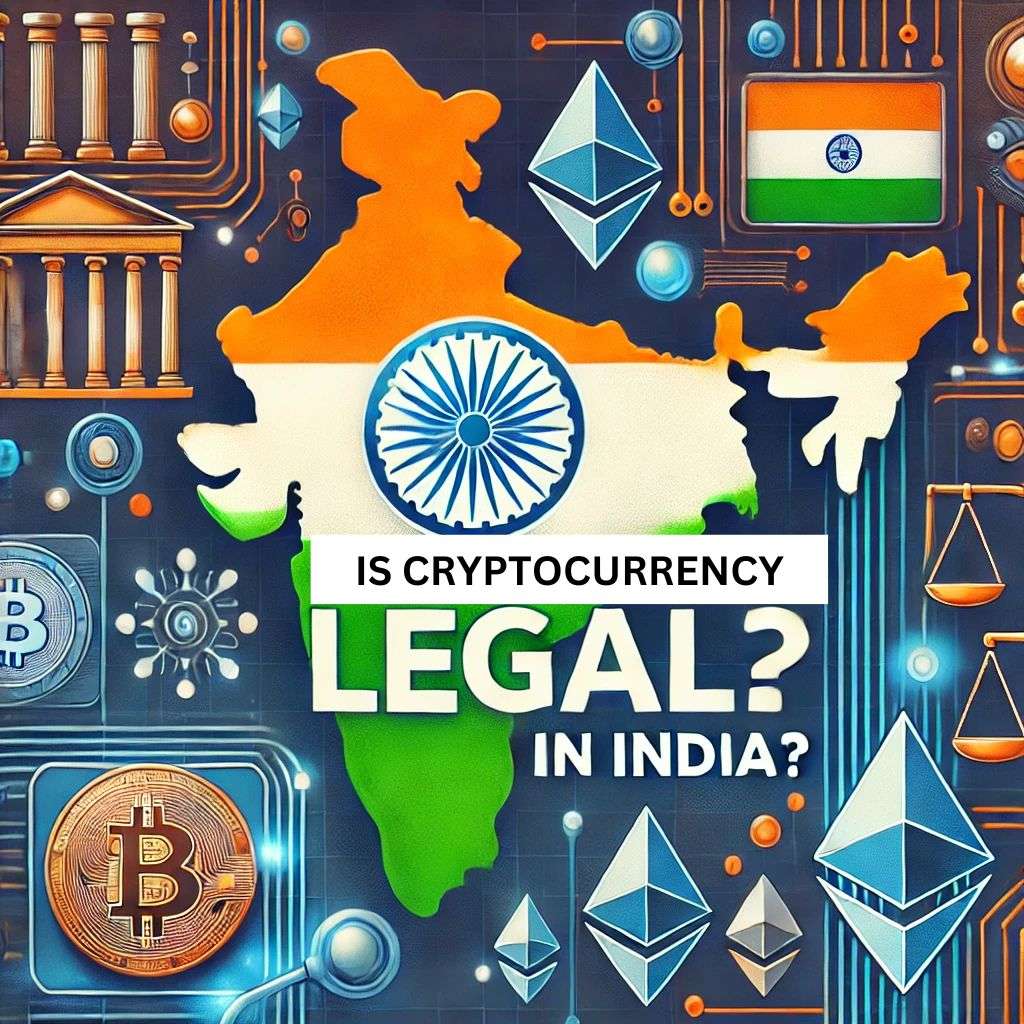Several predictions and estimations in 2026 suggested that India is going to have around 270 million crypto users, a figure surpassing the combined crypto investors of the United States and Europe. Despite the growing popularity of cryptocurrency in India, regulatory clarity remains limited. Let’s take a closer look at the legal challenges that crypto faces in India.
Is Cryptocurrency Legal in India?

In 2018, the Reserve Bank of India (RBI) placed a ban on cryptocurrency transactions within banks. But, in March 2020, the Supreme Court lifted this restriction and allowed banks to carry out cryptocurrency transactions. While this ruling permitted crypto transactions, these digital assets aren’t recognized as legal tender in India, and no formal legality or licensing mechanism exists for crypto operators as of now.
When asked whether is cryptocurrency legal in India, it can not be sure, but it remains unregulated as a payment method in India, meaning there are no formal rules or dispute resolution processes in place. Investors engage in crypto trading at their own risk.
So many times discussions happened around the legal status of cryptocurrency in India. Such discussions often are viewed as an initial step toward official recognition, but the government has yet to confirm whether cryptocurrencies are legal or not.
Launching a Crypto Venture? Our Specialists Are Here to Help!
Given various statements from officials, including the RBI Governor and the Finance Minister, some might interpret cryptocurrency as “illegal” in India. However, there is no outright ban. The government imposed a 30% tax on crypto gains and a 1% TDS in the 2022 Union Budget. Despite directly concluding, we can at least say that it has an unregulated status rather than saying it is illegal.
Cryptocurrency Legal Status in India: A Quick Overview
| Aspect | Legal Status in India | Details |
|---|---|---|
| Buying and Selling Cryptocurrency | Legal (with regulations) | Buying, selling, and trading cryptocurrencies is legal but regulated by the government. |
| Mining Cryptocurrencies | Legal (with regulations) | Mining is allowed, but miners must comply with local regulations regarding electricity usage and tax. |
| Cryptocurrency Exchanges | Legal (with KYC and AML requirements) | Crypto exchanges must follow Know Your Customer (KYC) and Anti-Money Laundering (AML) laws. |
| Initial Coin Offerings (ICOs) | Unclear, but risk of regulation | ICOs are not banned, but they are under scrutiny and may be subject to regulation. |
| Using Cryptocurrency for Payments | Unclear / Risk of future regulation | While using crypto for payments is not illegal, it’s not widely accepted and may face future restrictions. |
| Holding Cryptocurrency | Legal | It is legal to hold cryptocurrencies in India, though it is subject to tax. |
| Taxation on Cryptocurrency | Taxable (Capital Gains Tax) | Cryptocurrencies are subject to taxation under Indian tax law, including capital gains tax. |
| Government’s View on Cryptocurrency | Cautious, potential regulation or ban | The government has shown caution and is exploring regulations or a possible ban in the future. |
If Cryptocurrency Is Unregulated in India, What Risks Does It Pose?
The lack of regulation around cryptocurrency in India presents many possible risks to investors and the broader economy.
#1 Investor Risks
Increased Risk of Scams and Fraud🚨💸⚠️
Without regulation, crypto exchanges and ICOs (Initial Coin Offerings) will not be monitored, opening doors for scams like pump-and-dump schemes and fake ICOs that can lead to investor losses.
Security Vulnerabilities🔒⚠️💻
Exchanges not following any regulations may lack robust security measures, increasing the chances of hacks and theft.
Dispute Resolution Challenges⚖️🔍💬
Not having any regulations, it’s difficult to resolve conflicts between investors and exchanges.
Fraudulent ICOs🚫💰🎭
Several ICO scams have targeted Indian investors by promising high returns through fake projects. With no regulatory checks, investors find it hard to verify the authenticity of these ICOs, leading to potential financial losses.
#2 Market Risks
Market Manipulation📉🎭⚖️
A lack of oversight makes the Indian crypto market vulnerable to manipulation, where large investors can create artificial price changes, affecting smaller investors and causing volatility.
Money Laundering and Terror Financing💸🕵️♂️🚨
The anonymity in cryptocurrency transactions can invite criminal activities looking to launder money or fund illegal activities, potentially destabilizing the financial system.
Financial System Instability💥🏦⚠️
The rapid, unregulated growth of cryptocurrencies could disrupt the traditional financial system, especially if the market experiences a sudden crash.
#3 Pump-and-Dump Schemes
Pump-and-dump schemes are widely adopted in unregulated markets like India’s. These schemes involve intentionally inflating a cryptocurrency’s value, usually through aggressive buying and affecting promotions, and then suddenly selling, leaving investors with substantial losses. Here’s how they operate:
Sudden Price Spike📈⚡💥
The price of a targeted cryptocurrency suddenly rises, accompanied by a high trading volume.
Intensive Promotion📢🔥💥
Pump-and-dump organizers use marketing tactics on social media, forums, and other platforms to create hype around the cryptocurrency, drawing in unsuspecting investors.
Spreading False Information🚨❌📰
Organizers may share false information about partnerships, price predictions, or other factors to create a sense of urgency or “fear of missing out” (FOMO).
Dumping Phase 📉💣🚮
Once the price peaks, the organizers sell off their holdings, resulting in a sharp price fall.
Losses for Investors💸📉😔
Those who bought in during the “pump” phase at high prices are left with devalued assets as the price falls, resulting in financial damage.
With the lack of regulation, India’s crypto market is more susceptible to these tactics, posing risks for uninformed investors.
#4 Government and Regulatory Risks
Uncertain Tax Landscape💼❓📊
While the Indian government has imposed taxes on cryptocurrency gains, the absence of comprehensive regulations leaves investors uncertain about the future tax consequences.
Possible Bans or Restrictions🚫⚖️🔒
India is currently reviewing a crypto bill that could impose restrictions or even a complete ban on digital currencies. This ongoing ambiguity makes long-term investment in the crypto sector risky and may hinder innovation.
Cryptocurrency Bill: The Future of Crypto in India
The Cryptocurrency Bill 2021, introduced in the Lok Sabha, aims to provide a regulatory framework for India’s expanding cryptocurrency market. The industry has experienced a surge in investment, especially during the pandemic, from both domestic and global investors.
Crypto platforms like CoinDCX, Zebpay, and Mudrex have rapidly grown in transaction volumes across India. However, an unregulated market poses risks, especially as the government aims to protect investors and see the opportunities for innovation among young entrepreneurs.
By presenting the Cryptocurrency Bill, the government has signalled a move toward regulating digital currencies. The bill outlines the structure for a potential central digital currency to be launched by the Reserve Bank of India (RBI) while restricting private cryptocurrencies, with a few exceptions, to encourage the development of blockchain technology.
In the Union Budget of 2022, the government imposed a 30% tax on profits from digital assets, along with a 1% TDS on transactions, as an initial regulatory measure.
India’s Path to Crypto Regulation
The Cryptocurrency Bill 2021 is still under consideration and could take time before it’s ready for a full review and enactment. India has already taken a step toward crypto regulation by implementing taxation measures in the 2022 Union Budget. However, the formal introduction of the Cryptocurrency Bill marks a significant step forward in shaping the future of digital assets in India.
Disclaimer: This article is provided for informational purposes only. SAG IPL does not encourage investments in cryptocurrencies. Investing in cryptocurrency carries inherent risks, and it is unregulated in India or not certain about it. Potential investors should understand the risks involved.
Discover More Resources to Guide Your Cryptocurrency Journey







